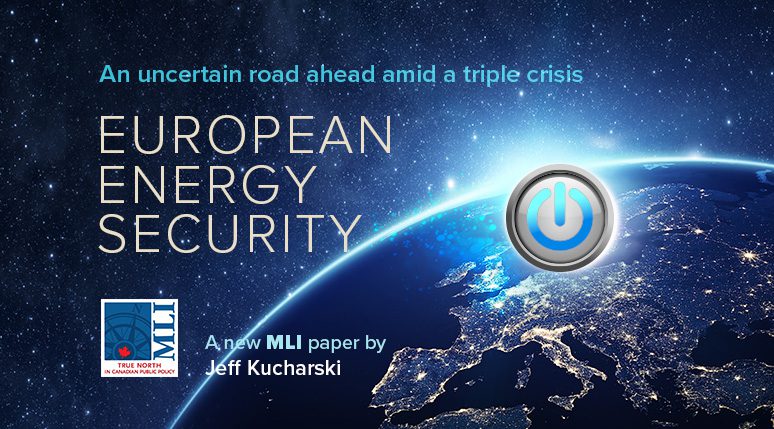OTTAWA, ON (April 19, 2023): As the world is racked by geopolitical, climate, and energy crises, nowhere is the impact felt more acutely than Europe. While the current energy crisis precedes Russia’s invasion of Ukraine, European nations have radically restructured their energy supply chains to reduce their dependence on Russia.
In this new MLI paper, European energy security: An uncertain road ahead amid a triple crisis, Senior Fellow Jeff Kucharski examines how Europe is affected by the energy crisis, what steps the European Union (EU) is taking to deal with it, and the implications of these policies on European energy security.
“With the energy crisis threatening the livelihood of both European consumers and industries, the future of the EU economy will depend largely on how its political leaders handle the energy crisis,” writes Kucharski.
According to Kucharski, the scope of Europe’s energy crisis is unprecedented: wholesale prices of electricity and gas have increased by a factor of 15 compared to early 2021. Whereas the EU has been able to shift its dependence to energy supplied from countries like the United States and Norway, energy prices have been both rising since mid-2021 and volatile due to changing commodity prices, heat waves, low water levels, and cutbacks in nuclear generation.
Consequently, the EU’s ambitious targets for renewable power mean that the demand for rare earth and critical minerals, crucial for the manufacture of a renewable energy infrastructure, may far exceed supply. The EU system, burdened with regulation and bureaucracy, risks losing out to the new incentives-based system in the US.
Canada was asked by some European leaders to help alleviate these energy supply issues, but Ottawa has acted with indifference. Indeed, despite proposals for several LNG export facilities over the years, none have yet been built. Beyond fossil fuels, Canada’s significant endowments of mineral resources, access to clean hydroelectricity, and emergent alternative energy sources like ammonia and hydrogen could also help contribute to European energy security over the longer-term.
In short, Canada’s contribution to Europe’s energy security is likely to be rhetorical rather than practical: while new export projects for oil and LNG will soon come online, Canada’s supply chains for critical minerals, batteries, and other clean energy technologies will take longer and are more likely to satisfy North America rather than Europe.
“Despite the ever-increasing ambition of the UN’s climate change summits and their singular focus on decarbonization, the invasion of Ukraine and the deepening energy crisis have demonstrated to the world that economies still rely heavily on hydrocarbons to meet their basic energy needs,” writes Kucharski.
“The fact remains that a hydrocarbon-based energy system will need to continue to exist alongside a growing clean energy system for several decades to come. Governments must balance decarbonization efforts with other important societal goals like economic stability, energy affordability, and national security.”
To learn more, read the full paper here:
***
Jeff Kucharski is a Senior Fellow at the Macdonald-Laurier Institute and an Adjunct Professor at Royal Roads University in Victoria, BC. Before retiring from the public service in 2012, he was an Assistant Deputy Minister in the Alberta Department of Energy responsible for international energy policy, strategic planning and intergovernmental relations.
For further information, media are invited to contact:
Skander Belouizdad
Communications Officer
613-482-8327 x111
skander.belouizdad@







